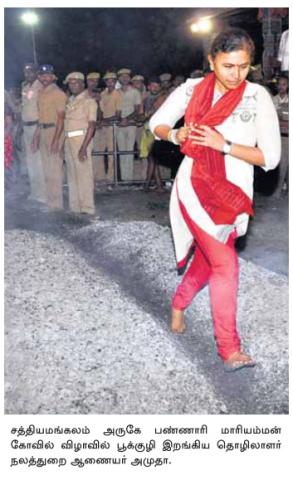உரையாடல் 22 தீயிலே எப்படி நடக்குறாங்க?
ராஜா - என்ன! நேத்து பூராவும் ஆளையே காணோம்.
ஜிம் - பொங்கல்லே ரெண்டு நாளா சரியா தூங்காததுனாலே நேத்து பூராவும்
தூக்கம் தூக்கமா வந்துது. பகல் பூராவும் தூங்குனேன்.
ராஜா - நானும் அப்படித்தான். நேத்து காலைலே படுத்தவன் சாயங்காலம் ஆறு
மணிக்குத்தான் எந்திரிச்சேன். மத்தியானம் சாப்பிடக்கூட இல்லை.
ஜிம் - முந்தா நாள் விடிய விடிய முழிச்சிருந்தது வீணாப் போகலை. வெறும்
காலோடே தீலே நடக்கிறது எனக்கு இன்னும் ஆச்சரியமாவே இருக்கு.
இதுலே ஏதாவது ஏமாத்து இருக்குமோ?
ராஜா - இல்லை. இதுக்கு நம்பிக்கைதான் காரணம். தீ மிதிக்கிறதுக்கு ஒரு
மாசத்துக்கு முன்னாலேருந்து ரெண்டு வேளை சாப்பிடாம இருக்கிறதும்
இதுக்கு ஒரு காரணமா இருக்கலாம். இன்னொரு காரணம் காலை
அழுத்தமா பதிக்காம வேகமா ஓடுறதாவும் இருக்கலாம்.
ஜிம் - ஒரு அம்மா மெதுவா நடந்து போனாங்களே.
ராஜா - ஆமா. நான் ஒரு தடவை ஒரு ஆள் கங்கை வாரி தலைலே போட்டுக்கிட்டதை
பாத்திருக்கேன். இதுலே சில பேருக்கு கால் புண்ணா போனதும் எனக்கு தெரியும்.
ஜிம் - அப்போ, கடவுள் மேலே நம்பிக்கை வைச்சு செய்றதுனாலே இதெல்லாம்
முடியுது, இல்லையா?
ராஜா - அப்படி சொல்றதுக்கு இல்லை. கடவுளை நம்பாதவங்க கூட கருப்பு
கொடி பிடிச்சிக்கிட்டு தீக்குழிலே எறங்கி போயிருக்காங்க. இவங்களுக்கு
வேறே ஒரு நம்பிக்கை. மனிதனுக்கு வாழ்க்கைலே ஒரு நம்பிக்கை
வேணும். அது இருந்தா அவன் எதுவும் செய்வான்.
ஜிம் - உண்மைதான்.
Credit: wikimedia
Glossary
பூராவும் /முழுசும், முழுவதும் ‘all of, full of’
ஆள் ‘person (referring to you)’
எந்திரி (எந்திரிக்க) எழுந்திரு ‘get up’
மத்தியானம் ‘afternoon’
விடிய விடிய ‘until dawn’
முழிச்சிரு விழித்திரு ‘be awake’
வீண் ‘waste’
வெறும் ‘bare, empty’
தீ ‘fire’
மிதி (மிதிக்க) ‘step on’
ஆச்சரியம் ‘surprise’
ஏமாத்து ஏமாற்று ‘cheating’ hoodwinking’
நம்பிக்கை ‘faith, belief, trust’
காரணம் ‘reason’
அழுத்தம் ‘pressure’
பதி (பதிக்க) ‘plant, place against a
'surface’
கங்கு ‘amber’
வார் (வார) ‘scoop’
புண் ‘wound’
நம்பிக்கை வை (வைக்க) ‘have faith’
தீக்குழி ‘fire pit’
எறங்கு (எறங்க) இறங்கு ‘descend, get down to’
கடவுள் ‘god’
கருப்பு கொடி ‘black flag (of a rationalist political party)
பிடி (பிடிக்க) ‘hold, catch’
வாழ்க்கை ‘life’
Additional words
விடி ‘dawn’
முழி விழி ‘wake up’
ஏமாறு (ஏமாற) ‘be cheated, fooled’
ஏமாத்து (ஏமாத்த) ஏமாற்று ‘cheat’
ஏமாத்தம் ஏமாற்றம் ‘disppointment’
நம்பு (நம்ப) ‘have faith, believe, trust’
நெருப்பு ‘fire’
காயம் ‘injury’
Exercises
- The verb of the relative participle has different case relationships with the modified noun it depending on linguistic and pragmatic contexts. Translate the sentences below with the relative pronoun in English showing the case relationship. The free standing post-positions may be present in the relative clause giving a clue for the case relationship
Ex. இது நான் படிச்ச காலேஜ்
‘This is the college in which / where I studied’
1. இவ காலேஜுலே என்னோடே படிச்ச பொண்ணு [பொண்ணு ‘girl’]
2. இவ நான் தெனம் காலேஜுலே பாக்குற பொண்ணு
3. இவ நான் காலேஜுலே தமிழ்லே பேசுற பொண்ணு
4. இவ நான் என் தமிழ் புஸ்தகத்தை குடுத்த பொண்ணு
5. இது நான் மேலே ஏறி உக்காந்த மேசை
- The verb of the relative participle may not have any case relationship with the modified noun. The relative participle may just modify the noun a sentential adjective. Translate the sentences below where the relative participle and the head noun have this relationship. They may also have a case relationship, but ignore it.
Ex. நான் சிகாகோவுலே படிச்ச கதை பெரிய கதை
‘The story of my studying at Chicago is a big story’
1. நான் அமெரிக்காவுக்கு வந்த கதையை ஒனக்கு சொல்லட்டுமா?
2. பூனை வீட்டுக்குள்ளே வந்த சத்தம் எனக்கு கேக்கலை [சத்தம் 'sound']
3. பிரியாணி சமைக்கிற வாசனை நல்லா வருது [பிரியாணி ‘briyani (rice cooked with spices and meat or vegetable)’, சமை ‘cook’, வாசனை ‘smell’]
4. அவனுக்கு சினிமா பாக்குற ஆசை இன்னும் போகலை
5. தூங்குற நேரம் தவிர அவ எப்பவும் டிவி முன்னாலேதான் உக்காந்துருப்பா
- Nouns can be made from relative participles as from adjectives. They are called Participial Nouns. Suppose the underlined nouns are erased in the sentences below. Make up these sentences using gender and number suffixes without resorting to any noun in their place. Translate the sentences you made.
Ex. எனக்கு பணம் குடுத்த ஆள் ரொம்ப நல்லவன்.
எனக்கு பணம் குடுத்தவன் ரொம்ப நல்லவன்.
‘The one / he who gave me money is a nice one / person’
- நம்ம வீட்டுக்கு வந்த பையன் பேர் ராஜா.
- சிகாகோவுலே படிச்ச மாணவங்க எல்லாரும் நல்ல வேலை பாக்கிறாங்க.
- ஒன்னோட தமிழ் படிக்கிற பொண்ணு இந்தியாவுக்கு போயிருக்காளா?
- நம்ம வீட்டுலே தெனம் பாலை குடிக்கிற பூனை கருப்பு பூனை.
- குமாரும் ராஜாவும் சொன்ன விஷயம் பொய்யா போச்சு. (பொய் ‘lie’)
- நீ சொன்ன விஷயத்துலேருந்து நான் உண்மையை புரிஞ்சுக்கிட்டேன். [விஷயம் ‘matter’, உண்மை ‘truth’]
- நம்ம வீட்டுக்கு வந்துருக்கிற ஆளுககிட்டே பேர் கேள். [ஆளுக ‘persons’]
- ஊர் நல்லா தெரிஞ்ச நானே வழி தெரியாம கஷ்டப்பட்டேன். [வழி ‘way’]
- எல்லாம் தெரிஞ்ச ஒனக்கு நான் என்ன சொல்ல போறேன்?
- நீ செருப்பு போடாம நடந்து வந்த சத்தம் எனக்கு கேக்கலை. [செருப்பு ‘sandals’, சத்தம் ‘noise’]
- The following sentences are similar to the above except that there are adjectives and genitives instead of relative participles. How will you make the sentences full when the underlined nouns after adjectives and genitives are irretrievably erased? Translate the sentences you made.
Ex. எனக்கு பணம் குடுத்த கடைக்காரன் ரொம்ப நல்ல ஆள்
எனக்கு பணம் குடுத்த கடைக்காரன் ரொம்ப நல்லவன்.
‘The shopkeeper who gave me money is a nice one’
- குமார் ரொம்ப நல்ல பையன்.
- குமாரி ரொம்ப அழகான பொண்ணு.
- இந்த ஊர் ஆளுக கெட்ட ஆளுக.
- கிழிஞ்ச சட்டை என் சட்டை. (சட்டை ‘shirt’, கிழி ‘tear’)
- இந்த பேனா என்னோட பேனா.
- இந்த புஸ்தகம் யாரோட புஸ்தகம்
- எப்பவும் நல்ல விஷயமே பேசுறது நல்லது.
- அழகான பொண்ணுகளுக்கு சீக்கிரம் கல்யாணம் நடக்கும். [சீக்கிரம் ‘quickly’)
- என் பேனா ஒன் பேனா மாதிரியே இருக்கு.
- கருப்பு பேனா யார் பேனா?
- The Tamil sentences below have a participial noun. Translate them into English. The English sentences below them can be translated into Tamil with a participial noun. Translate them into Tamil.
Ex. a. எனக்கு பிடிக்கிறது ஒனக்கு பிடிக்காது
‘You don’t like what I like’
b. Tell me what you like
ஒனக்கு பிடிக்கிறதை என்கிட்டே சொல்லு
1a. ராஜா மதுரைக்கு போறது யாருக்கும் தெரியாது.
b. It is not a good thing that Raja is going to Madurai.
2a. இதை நீ ஒங்க அப்பாகிட்டே சொல்றதுக்கு ரொம்ப தைரியம் வேணும். [தைரியம் ‘courage’]
b. I do not have time to tell this to father.
3a பாலை குடிச்சது பூனையா?
b. This is not the cat that ran away.
4a நல்லா படிக்கிறவங்க நல்ல மார்க் வாங்குவாங்க. [மார்க் ‘mark, grade’]
b. One who came to our house will come today also.
5a. எனக்கு தெரிஞ்சவன் வீடு இந்த ஊர்லே இருக்கு.
b. Do you know the name of the person who said this?
6a ஒன்னோட படிச்சவங்க இப்போ என்ன வேலை செய்றாங்க?
b. Where did the people study who work with you?
7a. நேத்து பேராசிரியர் வகுப்புலே சொன்னது எனக்கு இன்னும் மனசுலே இருக்கு.
b. Do you still remember (have in mind) what you learnt last year?
8a. நான் பணம் குடுத்தவன் எங்கேயோ ஓடிப்போயிட்டான்.
b. Where did the one whom you hit disappear (go away)?
9a. நீ புஸ்தகம் வித்தவன் யார்?
b. Who is the one who sold you the book?
10a எனக்கு வேண்டியதை நீ வாங்கிக்கிட்டு வந்துருக்கியா?
b. Do what you could.
- The verbal nouns referring to action in the sentences below are in the present tense. Change the tense into past and translate (or paraphrase) the sentences.
Ex. நீ பத்து மணி நேரம் தூங்குறது நல்லது இல்லை
‘It is not good that you sleep for ten hours’
நீ பத்து மணி நேரம் தூங்குனது நல்லது இல்லை
‘It is not good that you slept for ten hours’
- ராஜா பாடுறது நல்லா இல்லை.
‘Raja’s singing is not good’
- ராஜா வர்றது எனக்கு தெரியாது.
‘I don’t know that Raja is coming’
- ராஜா இப்படி சொல்றது எனக்கு பிடிக்கலை.
‘I don’t like that Raja is speaking like this’
- நாம ஓட்டல்லே கறி சாப்பிடுறது அம்மாவுக்கு தெரியும்.
‘Mother knows that we eat meat in the restaurant’
- நான் சிகாகோவுலே படிக்கிறதை அப்பா எல்லார்கிட்டேயும் சொல்லுவார்.
‘Father tells everyone that I study in Chicago’
- நான் குடிக்கிறதை அப்பா பாக்கலை.
‘Father didn’t see me drinking’
- நான் குடிக்கிறதை அப்பாகிட்டே சொல்லாதே.
‘Don’t tell father that I drink’
- நான் புஸ்தகம் வாங்குறதுக்கு அப்பா பணம் குடுப்பார்.
‘Father will give me money for me to buy books’
- நான் அவனுக்கு ஒதவி செய்றதுக்கு அவன் எனக்கு என்ன செய்வான்?
‘What will he do (back) to me for me helping him?’
- நீ பேசுறதுலே தப்பே இல்லை.
‘There is nothing wrong in your speaking’
- Fill in the blanks with an appropriate form of the verb given in parentheses after the blank. The appropriate form may be an infinitive (போக), a relative participle (போனா, போற), verbal participle (போய்) a participial noun (போனவன், போறவன்), a verbal noun (போனது, போறது) (in the case of nouns to add a case marker will be appropriate). A translation of the text is given at the bottom to help you with meaning.
ராஜா ----------------- (படி) வகுப்புலேதான் ராணியும் படிக்கிறா. மார்க் -------------------
(வாங்க) ரெண்டு பேருக்கும் போட்டி. தமிழ் பேராசிரியர்கிட்டே நூத்துக்கு அறுபது
மார்க்குக்கு மேலே --------------------- (வாங்கு) கஷ்டம். அவர் நெறைய தமிழ்
இலக்கியம் -------------------- (படி) . இலக்கிய வரிகளை அப்படியே கட்டுரைலே
---------------------------- (எழுது) அவருக்கு பிடிக்கும். ராஜாவும் ராணியும் -----------------
--------- (கஷ்டப்படு) படிச்சாங்க. ---------------- (தூங்கு) நேரம் தவிர மத்த நேரம்
எல்லாம் ------------------------- (படி) செலவழிச்சாங்க. அது ------------------ (தெரி)
பேராசிரியர் அவங்களை பாராட்டுனார். வகுப்புலே ----------------- (இரு) எல்லாரையும்
அவங்களை மாதிரி கஷ்டப்பட்டு -------------- (படி) சொன்னார்.
Rani studies in the same class Raja studied. Both have competition (compete with each other) in getting (good) marks. Getting more than 60 out of 100 from the Tamil professor is difficult. He is a learned one in literature. He likes (students) writing as they are literary lines (lines from literature) in their essays. Raja and Rani studied painstakingly (worked hard in their studies). They spent in studying all other times besides (all times other than) the sleeping time. Knowing that, the professor appreciated them. He told everyone who were in the class to work hard like them.
- The negative relative participle is formed by adding -ஆத to the verb base (same as the base of the infinitive without -அ). It is not marked for tense. The negative of இருக்குற / இருந்த is இல்லாத. Participial nouns can be formed from the negative verbal participle in the same way they are formed from the positive relative participle. Change the positive relative participles in the sentences below into negative and translate both.
Ex. இது நான் படிச்ச புஸ்தகம்
This is the book I read
இது நான் படிக்காத புஸ்தகம்
This is the book I haven’t read.
1. இது எனக்கு பிடிச்ச பாட்டு
2. எனக்கு தெரிஞ்ச பெயர் எதுவும் இந்த புஸ்தகத்துலே இல்லை
3. இது நான் தூங்குற நேரம்
4. நீ கேட்ட புஸ்தகத்தை வாங்கிருக்கேன்
5. நீ வாங்க முடியுற சாமான் இந்த கடைலே இருக்கா?
6. நீ படிக்கிற நேரத்துலே நான் தூங்கக் கூடாது
7. அப்பா இருக்குற நேரத்துலே வீட்டுக்கு போகணும்
8. நம்ம வீட்டுக்கு எப்பவும் வர்றவன் வந்துருக்கான்
9. இந்த சினிமாவை பாத்தவங்க கொஞ்சப் பேர்தான்.
10. பணம் இருக்குறவங்க இப்படிதான் நடப்பாங்க [நட ‘behave’]
- How would you say in Tamil the following in English? ‘What’ is these sentences stands for a neuter noun that has a case relation with the verb in the ‘what’ sentence such as ‘object’, indirect object’ etc.
Ex. There is nothing that I do not know
எனக்கு தெரியாதது ஒண்ணும் இல்லை
1. I told everyone what I knew.
2. I will tell you what I know
3. I don’t like now what I liked before.
4. Eat what you like.
5. Nobody likes what I like.
6. What you have understood is enough.
7. This (much) is all what I understand.
8. I did what I could.
9. I will give what I can (give).
10. What I could give is just this much.
11. Ask me what you want.
12. What I need is just 100 dollars.
13. I have told all of what I should / need to tell.
14. There is still a lot of what I need to study.
15. What is it that you need to know?
- The meaning of வேணும் is inseparably both desire / wish and need / necessity. To express need / necessity alone, its nominal form வேண்டியது (also alternatively, its verbal participle form வேண்டி) is used, which is followed by the verb இரு with tense or இல்லை for the negative. The verb வா could also be used in place of இரு with வேண்டி (see (5) below). Translate the sentences below.
Ex. நீ இந்தியாவுக்கு போக வேண்டியதிருக்கும்
‘You will have to go to India’
1. இந்த வேலைக்கு நாம என்ன படிக்க வேண்டியதிருக்கும்?
2. நான் அவசரமா வெளியே போக வேண்டியதிருந்துது
3. ஒன் நன்மைக்காக நான் பொய் சொல்ல வேண்டியதிருக்கு [நன்மை ‘good, benefit’]
4. என் செலவுக்கு மட்டும் மாசம் ஆயிரம் டாலர் வேண்டியிருக்கு [செலவு ‘expense’]
5. ஒன்னாலே நான் எல்லாத்தையும் அம்மாகிட்டே சொல்ல வேண்டி வந்துது.
6. அடுத்த மாசத்துலேருந்து நாம வெளியே எங்கேயும் போக வேண்டியதில்லை
- The noun தேவை ‘need’ can be used alternatively in place of வேண்டியது (or வேண்டி) in the same meaning. The verb is படு with this noun instead of இரு or வா as in (10). Rewrite the sentences in (10) with this verb.
Ex. நீ இந்தியாவுக்கு போக தேவைப்படும்
- The verbal noun in the present tense can be used in place of the modal of possibility and probability (முடியும், -லாம் and future) in interrogative and in suggestive sentences. In the interrogative sentences (see (3) below), it may suggest the negative (impossibility, improbability) rhetorically. Convert the modal verbs in the sentences below with the verbal nouns and translate.
Ex. ஒனக்கு காய்ச்சல் அடிக்குது; லீவு எடுக்கலாமே!
‘ஒனக்கு காய்ச்சல் அடிக்குது, லீவு எடுக்குறதுதானே!
1. ஒனக்கு வேலைலே கஷ்டம்; அதுக்கு நான் என்ன செய்ய முடியும்?
2. இந்த விஷயத்தை நீ எப்படி அப்பாகிட்டே சொல்ல முடியும்?
3. நீ கடன் கேக்குறே; நான் பணத்துக்கு எங்கே போவேன்? [கடன் ‘loan’]
4. எனக்கு வேலை போயிருச்சு; என்ன செய்யலாம்னு தெரியலை
5. இண்ணைக்கு வேலை இல்லை; எங்கே போகலாம்னு சொல்லு
Handouts
- Words and Phrases usinng words of Body Parts
கை hand (of humans, chairs, shirts)
Nouns
கைப்பை handbag
கைத்தறி handloom
கைத்தடி walking stick
கைச்செலவு incidental / pocket expense
கைத்தொழில் handicraft
கைப்பக்குவம் inimitable experience from doing by self (in cooking, curing)
கைப்பழக்கம் manual skill or dexterity acquired by practice
கைப்பாவை puppet (of another person)
கையிருப்பு balance after expense
கையெழுத்து signature, hand-writing
கையாள் henchman, crony
கைரேகை line on the palm, palmistry
கைவரிசை sleight of hand, cleverness
கைவேலை work on hand at a given moment
கைக்குழந்தை baby in arms
கைமாற்று petty loan from a person (without interest or collateral)
Verbs
கைவிடு (விட) drop, give up (a plan, idea), let down
கைகழுவு (கழுவ) wash one’s hands off
கைகொடு (கொடுக்க) give a helping hand
கைதட்டு (தட்ட) clap
கைகாட்டு (காட்ட) show a way
கைநீட்டு (நீட்ட) ask for monetary help, beat
கைதூக்கு raise hand in support of
கைதூக்கிவிடு (விட) help one come out of straits
கைபார் (பார்க்க) do something (like eating, punishing with full force or intensity
கையாடு (ஆட) embezzle, misappropriate
கைவை (வைக்க) embezzle, steal; deprive someone lay hands on
கைக்குள்போடு (போட) have someone under one’s sway / in one’s pocket
கையெடுத்துக் கும்பிடு request prayerfully, supplicating oneself
கைகட்டி நில் stand obediently (as an inferior)
Other Forms
கையாலாகாத being good for nothing
கைகட்டி (வேலை செய்) (work for someone) with folded hands
கைகொட்டி (சிரி) (laugh) derisively, mockingly
கைகோத்துக்கொண்டு clasping hands, hand in hand
கைதேர்ந்த adept
கைப்பட by one’s own hand
கையும் களவுமாக red handed
- Words for mental activities
மனம், மனசு ‘mind’
மனசு வரலை ‘ cannot pull one’s mind (to do something)’
மனசு /மனம் இல்லை ‘ ‘do not have the mind (to do something)’
மனசில் வைத்துக்கொள் (-கொள்ள, கொண்டு) ‘keep in mind’
மனசுக்குள்ளே வைத்துக்கொள் ‘keep in one’s mind as a secret’
பெரிய மனசுபண்ணி ‘with a large heart, condescending’
மனம் திறந்து /விட்டு பேசு ‘speak openly / without inhibitions’
மனக்கோட்டை ‘castle in the air’
மனப்பாடம் ‘knowing by heart’
மனப்பாடம் பண்னு ‘memorize’
மனக்கணக்கு ‘arithmetic done mentally’
மனவேற்றுமை ‘difference of opinion’
மனப்பான்மை ‘mentality’
மனஸ்தாபம் ‘bickering due to difference of opnion’
மனப்பிராந்தி ‘phobia’
மனப்பூர்வமாக ‘whole heartedly’
மனம்போனபடி ‘as one likes, as one’s mind takes him’
யோசி (யோசிக்க, யோசித்து) ‘think (about an issue, problem)’
யோசித்துப்பார் (பார்க்க, பார்த்து) ‘think about, consider, deliberate on’
யோசித்துப் பேசு ‘speak after thinking / cautiously’
யோசனை ‘idea, plan, thinking’
யோசனை சொல்லு ‘give me an idea, advise’
நினை (நினைக்க, நினைத்து) ‘think of somebody / something’
நினைத்துப்பார் ‘bring to mind’
நினைவு / நினைப்பு ‘remembrance, remembering’
நினைவுச்சின்னம் ‘memorial’
நினைவு தப்பு (தப்ப, தப்பி) ‘lose consciousness
நினைவு திரும்பு (திரும்ப, திரும்பி) ‘regain consciousness’
ஞாபகப்படுத்து (படுத்த, -படுத்தி) ‘remind, remember to someone’
ஞாபகம் ‘memory, remembrance’
ஞாபக மறதி ‘forgetfulness, lapse of memory’
ஞாபகார்த்தம் ‘being in memory of’
மற (மறக்க, மறந்து) ‘forget’
மறதி ‘forgetfulness, lapse of memory’
சிந்தி (சிந்திக்க, சிந்தித்து) ‘think (intellectually)’
சிந்தித்துப்பார் ‘think about something (intellectually)
சிந்தனை ‘(intellectual) thought’
சிந்தனைவாதி ‘thinker’
திட்டம்போடு (போட, போட்டு) ‘plan’
திட்டம் ‘plan’
சூழ்ச்சிபண்ணு ‘conspire, trick (someone) into’
சூழ்ச்சி ‘conspiracy, trick’
சூழ்ச்சிக்காரன் ‘schemer, conspirator’
முடிவுசெய் (செய்ய, செய்து) ‘decide, bring to closure’
முடிவு ‘decision, end’
கற்பனைபண்ணு ‘imagine, think of something to be real’
கற்பனைபண்ணிப்பார் ‘imagine something happening or existing’
நம்பு (நம்ப நம்பி) ‘trust, have faith in, believe, hope’
நம்பிக்கை ‘hope; trust, faith, confidence’
அவநம்பிக்கை ‘lack of faith, lack of optimism’
மூடநம்பிக்கை ‘superstition’
புத்திசொல்லு (சொல்ல, சொல்லி)
புத்தி ‘intelligence’
புத்திசாலி intelligent person’
புத்திகெட்டவன் /ள் ‘foolish person, one who does not exercise his mind’
அறிவு ‘knowledge’
அறிவாளி ‘person of knowledge, scholar’
அறிவுகெட்டவன் /ள் ‘one without brains’
தெரிந்துகொள் ‘learn, come to know’
விபரம் தெரிந்தவன் /ள் ‘well-informed person, knowledgeable person’
மடையன் / மடைச்சி ‘fool (m) / fool (f)
மடத்தனம் ‘foolishness’
முட்டாள் ‘fool, dumb’
முட்டாள்தனம் ‘foolishness, being not clever’
குழம்பு ‘get confused’
குழம்பியிரு / குழம்பிப்போயிரு ‘be in a state of confusion’
குழப்பு ‘confuse (someone)’
குழப்பம் ‘confusion’
தெளிந்திரு ‘be in a state of clarity of mind’
தெளிவு ‘clarity, clarity of mind’
- Illustrative sentences with words of mental activities
Tamil uses words of mental activity to express intention, desire, thinking etc.
- மனம் / மனசு இல்லை
இண்ணைக்கு எனக்கு படிக்கவே மனசு இல்லை.
- மனம் / மனசு வா
நாயை அடிக்க அவளுக்கு மனசு வரலை.
- மனம் விட்டு
நீ மனம்விட்டு பேசுனா ஒன் வேதனை கொஞ்சம் கொறையும்.
- மனப்பாடம்
எனக்கு திருக்குறள் மனப்பாடம்.
- மனம் போனபடி
எங்க அண்ணன் மனம் போனபடி பேசி என்னை புண்படுத்திட்டான்.
- மனஸ்தாபம்
ஒங்க ரெண்டு பேருக்குள்ளேயும் எதாவது மனஸ்தாபம் இருந்தால் பேசி தீத்துக்கங்க.
- யோசி
இந்த காரியத்தை நல்லா யோசிச்சு செய்.
- யோசனை
வியாபாரம் ஆரம்பிக்கிறதுக்கு ஒரு நல்ல யோசனை இருந்தா சொல்லு.
- யோசனை பண்ணு
நாம ரெண்டு பேரும் சேந்து வியாபாரம் ஆரம்பிக்கலாம்; யோசனை பண்ணி சொல்லு.
- நினை
நாம ரெண்டு பேரும் சேந்து வியாபாரம் பண்ணுறதை பத்தி என்ன நெனைக்கிறே?
- நினை
நான் படிச்சு முடிச்ச பெறகு வியாபாரம் செய்யலாம்னு நெனைக்கிறேன்.
- நினைவுச் சின்னம்
கன்னியாகுமரிலே திருவள்ளுவருக்கு ஒரு நெனவுச் சின்னம் இருக்கு.
- ஞாபகம்
எனக்கு இந்த படத்தை பாத்த ஞாபகம் இல்லை.
- ஞாபகப்படுத்து
சாயங்காலம் வீட்டுப்பாடம் செய்றதைப் பத்தி ஞாபகப்படுத்து.
- திட்டம் போடு
கோடைகாலத்துலே என்ன செய்யலாம்னு திட்டம் போடலாமா?
- சூழ்ச்சி பண்ணு
எங்க அண்ணன் ஒரு சூழ்ச்சி பண்ணி எங்களை சினிமாவுக்கு போகவிடாம பண்ணிட்டான்.
- முடிவு பண்ணு
கல்யாணத்தை பத்தி என்ன முடிவு பண்ணிருக்கே?
- முடிவு
கல்யாணத்தை பத்தி ஒன் முடிவு என்ன?
- கற்பனைபண்ணு
நடக்கப் போற கல்யாணத்தை பத்தி ரொம்ப கற்பனைபண்ணிக்கிட்டுருக்கியா?
- கற்பனை
இந்த கதைலே செத்துப்போனவன் திரும்பிவர்றது அபத்தமான கற்பனை.
Practice understanding these sentences through translation and making additional sentences in Tamil.
- Example sentences in English which will use the Tamil words in parentheses.
- I don’t have the mind to go out now. (மனம் / மனசு இல்லை )
- I couldn’t gather myself to hit the dog. (மனம் / மனசு வா )
- He doesn’t speak anything with an open heart / openly. (மனம் விட்டு)
- Have you memorized this song? (மனப்பாடம் )
- He spoke about me indiscriminately. (மனம் போனபடி)
- We two have a small dispute / difference of opinion among ourselves. (மனஸ்தாபம்)
- I thought about this job the whole of last night. (யோசி)
- Give me an idea to buy a car at a low / cheap price. (யோசனை)
- I can buy you a car for less than 1000 dollars; think about this and tell me. (யோசனை பண்ணு )
- What do you think of my idea of buying a car for 1000 dollars? (நினை)
- I am thinking of going to India in the summer. (நினை)
- Is there a memorial for Gandhi anywhere in the U.S.? (நினைவுச் சின்னம்)
- Have we seen this place before? I don’t remember. (ஞாபகம் )
- Remind me of this work tomorrow. (ஞாபகப்படுத்து)
- We have made a plan to go to India in the summer. (திட்டம் போடு)
- We planned a trick to go to a movie without father knowing it. (சூழ்ச்சி பண்ணு)
- What have you decided about going to India? (முடிவு பண்ணு)
- What is your decision about my going to India? (முடிவு)
- Don’t be imagining / dreaming now itself about going to India. (கற்பனைபண்ணு)
- The ending of this movie is a good imagination. (கற்பனை)
Practice making Tamil sentences using the Tamil words in parantheses that will give the sense of the English sentences.




